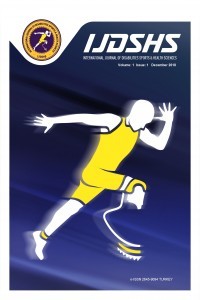Investigation of Attitudes towards Leisure Satisfaction of Individuals Attending Fitness Centers
Investigation of Attitudes towards Leisure Satisfaction of Individuals Attending Fitness Centers
Fitness, Recreation Satisfaction, Attitude,
___
- Akdeniz, S. (2004). The importance of service concept in private sports centers and an application for customer satisfaction. Anadolu University Institute of Social Sciences: Master's thesis.
- Akgül, B. (2011). Evaluation of attitudes of individuals in different cultures towards leisure time activities: Ankara-London example. (Unpublished doctoral dissertation). Gazi University Institute of Health Sciences, Ankara.
- Akyüz, H., Türkmen, M. (2016). Investigation of university students' attitudes towards leisure time activities: The case of Bartın University. International Journal of Sport Culture and Science, 4(Special Issue 1), 340-357. Doi: 10.14486/IntJSCS562
- Argan, M. (2007). Entertainment marketing (1st Edition). Ankara: Detay Publishing. 452- 455.
- Aytaç, Ö. (2005). Capitalism and leisure time. Eskişehir Osmangazi University Journal of Social Sciences, 6(1), 1-22.
- Bahadır, M. (2016). An evaluation on leisure time from antiquity to the present day. Erzurum Technical University Journal of Institute of Social Sciences, 1(2), 103- 116.
- Çuhadar, A., Yusuf, E., Demirel, M., Demirel, D. H. (2019). Investigation of factors motivating individuals to exercise for recreational purposes. Spormetre Journal of Physical Education and Sports Sciences, 17(3), 153-161. https://doi.org/10.33689/ spormetre.562233
- Durmaz, H. (2020). The relationship between young people's attitudes towards leisure time activities and satisfaction and happiness levels: Manisa Youth Centers example. (Master's Thesis). National thesis center.
- Ekenci, G. & İmamoğlu, A. F. (2002). Sport management. Nobel publication distribution.
- Karaküçük, S., & Gürbüz, B. (2007). Recreation and Urbanization. (1st Edition). 73-89. Ankara: Gazi bookstore.
- Kaya, S., Gürbüz, B. (2015). An Examination of university students' attitudes towards leisure activities. Pamukkale Journal of Sport Sciences, 6(3), 46-60.
- Koçer, H. A. (1980). History of education:(First age). Ankara University Faculty of Education Publications, (89).
- Korkutata, A. & Özavci, R. (2022). Investigation Of The Leisure Time Attitudes Of The Personnel Working In The Public And Private Sectors. Turar Tourism and Research Journal , 11 (2) , 158-176 . Retrieved from https://dergipark.org.tr/tr/pub/turar/issue/ 71403/1148501
- Koruç, Z. and Arsan, N. (2009). Factors following exercise behavior: Exercise addiction and exercise adherence. Journal of Sports Medicine, 44, 97-104.
- Lee,T. H. (2009). A Structural Model to Examine How Destination Image, Attitude, and Motivation Affect the Future Behavior of Tourists. Leisure Sciences, 31: 215-236. https://doi.org/10.1080/01490400902837787 Ozer, K. (2001). Physical fitness. 1st Edition, Ankara: Nobel Publications.
- Passmore, A., French, D. (2001). Development and administration of a measure to assess adolescents' participation in leisure activities. Adolescence, 36(141), 67.
- Ramazanoğlu, F. & Öcalan, M. (2005). Understanding of Business Administration and Personnel Management in Sports Enterprises. Fırat University Eastern Research Journal , 4 (1) , 36-40 . Retrieved fromhttps://dergipark.org.tr/tr/pub/fudad/ issue/47056/591946
- Sagiroglu, I., Ayar, H. (2017). Investigation of motivational factors that are effective in participation in fitness and crossfit centers for recreational exercise. International Anatolian Journal of Sport Sciences, 2(2), 167-179.
- Sanin, B. (2019). Incelenmesi of attitudes towards leisure time activities of students of sports management program of vocational colleges in Turkey. (Doctoral dissertation). Marmara University
- Serdar, E. (2020). The relationship between leisure time attitude, leisure time satisfaction and perceived health outcomes in recreation. (Doctoral dissertation). National thesis center.
- Smith, H. W. (1998). The 10 natural laws of managing life and time. (trans. Adalet Çelbiş). Istanbul: Sistem Publishing. Sucu, Y. (1996). Effective Use of Managerial Time. Handbook, Bolu.
- Togo, O. T. & Öztürk, A. (2020). Investigation of Attitudes Towards Sports of Employees Participating in Sports Organizations: The Case of Corporate League . Journal of Sport and Performance Research , 11 (1) , 55-64. https://doi.org/10.17155/omuspd.541185
- Torkildsen, G. (1998). Leisure and Recreation Management (4 ed.). E & FN Spon.
- Torkildsen, G., Taylor, P. (2012). Torkildsen's sport and leisure management. London: Routledge.
- Uz, İ. (2015). Examination of exercise addiction in individuals who regularly attend fitness centers. Çanakkale Onsekiz Mart University: Unpublished master's thesis.
- Yıldız, H., Yiğiter, K. (2018). Investigation of leisure time attitudes and hopelessness levels of Düzce Police Department personnel Journal of Social And Humanities Sciences Research (JSHSR), 5(25), 1983-1995. https://doi.org/10.26450/jshsr.569
- Yayın Aralığı: Yılda 3 Sayı
- Başlangıç: 2018
- Yayıncı: Nevzat DEMİRCİ
Evaluation of FMS Scores of Competitive CrossFit Athletes by Gender
Esra KÜRKCÜ AKGÖNÜL, Cem GÜÇLÜERLER
Investigation of the Effect of Playing Sports on Social Appearance Anxiety
Zeynep Senem SÖYLEYİCİ ÖCAL, Recep Fatih KAYHAN
Investigation of the Effects of Game and Yoga Training on Social Integration and Subjective Wellness
An Overview of Paralympic Sport from a Historical and Psychosocial Perspective
İhsan YAĞCI, Cuneyt SEYDİOĞLU, Kubilay ÇİMEN, Ünsal TAZEGÜL
Comparative Analysis of the Effects of Sport and Music on the Respiratory System
The Comparison of Reaction Times in Competing Karate Athletes
